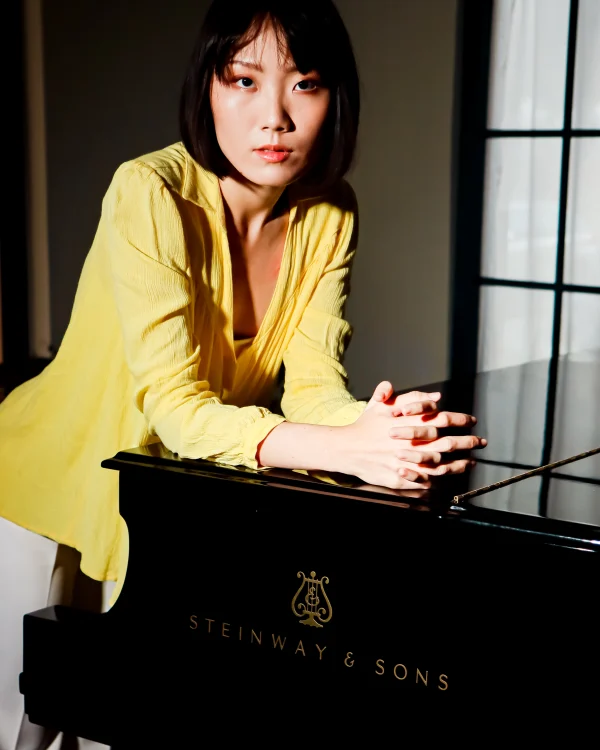About
10 years of top conservatory experience (Juilliard, Peabody, NEC) and 5+ years of helping students to win competitions and auditions.
Specialties
Years experience
Able to read music
Lesson length
Student's age
Student has instrument
Interested musical styles
Photos and videos

Reviews
Jasmine Y.
Lydia L.
Yiying N.
Anna K.
SHAO, H.
PC Y.
Frequently asked questions
What education and/or training do you have that relates to your work?
- Currently, Peabody Institue of Johns Hopkins University, Doctor of Musical Arts on Piano Performance
- 2020, The Juilliard School, Master of Music on Piano Performance
- 2018, New England Conservatory, Bachlor of Music on piano performance.
Bio:
Taiwanese pianist Xin-Hua Richarlita You is pursuing her career as a soloist, chamber musician, and music educator. As a soloist, Richarlita has performed in remarkable concert venues including National Concert Hall in Taipei, Jordan Hall in Boston, Hertz Hall in Berkeley, and Peter Jay Sharp Theater at Lincoln Center in New York City. As a chamber musician, she has appeared in important concert series such as ChamberFest at Lincoln Center in New York, NEC Complete Ravel Works concert series in Boston, and Chamber Music Collectives in Berkeley. She has also performed with renowned musicians such as Natasha Brofsky, Keiran Campbell, and Lucy Russell. As a music educator, Richarlita started her collaboration with important music institutes as a lecturer in Taiwan since 2021 such as Centre Claude Debussy
Since the age of 13, Richarlita has appeared and performed in major international music festivals such as Bowdoin Music Festival, Aspen Music Festival, Music Fest Perugia, and International Keyboard Odyssiad & Festival. She was awarded the first prize of International Keyboard Odyssiad & Festival Piano Competition in 2018. She received several merit awards and scholarship awards during her studies at New England Conservatory where she studied with Vivian Hornic Weilerstein and The Juilliard School with Matti Raekallio. Currently, Richarlita is pursuing her Doctor of Musical Arts degree at Peabody Institute of Johns Hopkins University under the guidance of her teacher and mentor Seth Knopp as a recipient of Artistic Excellence Scholarship as well as Graduate Assistantship Award.
Do you have a standard pricing system for your lessons? If so, please share the details here.
One-hour lesson will be charged $60 which include the followings:
1. Piano techniques
2. Applicable music theory
3. Music history related to the repertoire
4. Developnment of musicianship
5. Exploring additional music repertoire according to the students' interests and needs
6. Consultation session or brief discussion to ensure the learning experience is interesting, helpful, fulfilling and inspiring for the students.
In addition, I provide office hour to answer questions that occur throughout the week before the next lesson for free of charge.
How did you get started teaching?
After the second year of my undergrad, I started to have a more systematic way of learning music and practicing for myself. Later on, as my passion on music kept growing bigger, I wanted to share with poeple who are also intersted in learning music and in need of some learning methods as well. Therefore, I started to work with a few students and started my path on teaching the piano. The more I teach, the more I can share. Despite that, I always got a tremendous amount of inspirations from my students, and that motivates me even more!
What types of students have you worked with?
- adult non-professional musicians
- teenagers who were preparing for conservatory preparatory programs and competitions
- kids
- beginners of all age.
What questions should students think through before talking to teachers about their needs?
1. Why do you want to learn piano?
Wether you are learning the piano for fun or for more serious persue, it's important for the instructor to know what you are expecting to get out of lessons. Therefore, preper lesson plans and goals can be made that meet your needs.
2. How much time and effort would you be willing and able to put into your piano jorney?
Think about this first, so we can come up with a practice plan that will be realistic and pracitcal according to your situation. You don't need to practice 3 hours a day, nor should you worry about not practice "enough" if this question has been considered carefully. The key is consistency. Only praicticig consistently will make your progress visible.
3. budget for your music education.
This is important to consider in order to have a sustainable piano learning experience. Every one has different budget for their music education and that is absolutly fine. This should be considered ahead of time so that the students can have a learning plan without being stressed for the finaincial situation.